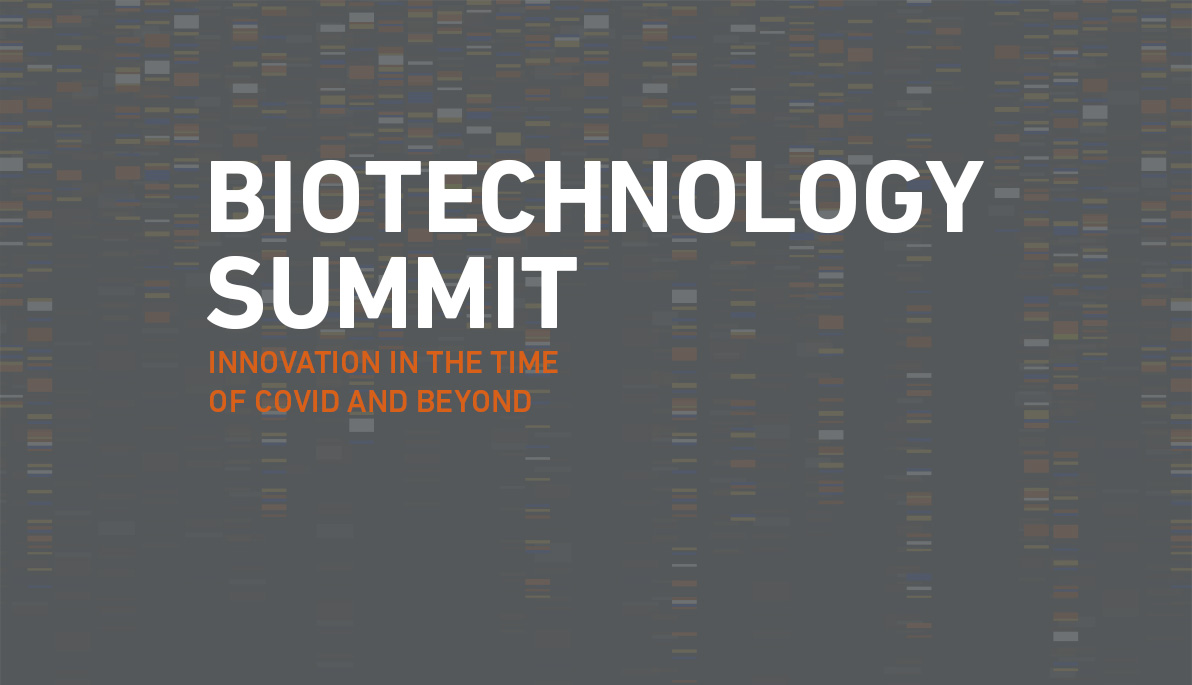
Biotechnology, COVID-19, and Beyond
April 14, 2021
On April 8, industry experts and educators came together virtually for the Biotechnology Summit: “Innovation in the Time of COVID and Beyond” to discuss the latest research and how it is improving patients’ quality of life and reshaping the future of patient care.
The conversation focused on the accomplishments of the biotech industry during the COVID-19 global pandemic, from the creation of innovative ICU equipment to the rapid development of COVID-19 tests and vaccines.
The event kicked off with welcoming remarks by New York Institute of Technology President Hank Foley, Ph.D., and Babak D. Beheshti, Ph.D., dean of NYIT College of Engineering and Computing Sciences.
“New York Tech’s College of Engineering and Computing Sciences is well-positioned to be a hub of innovation in biotech, as it forges partnerships and collaboration with biotech industry leaders and globally leading research institutes,” said Beheshti. “With an impending B.S. degree in bioengineering, a well-respected M.S. program in bioengineering, and soon to be approved a Ph.D. program in engineering, with a bioengineering track, expansion of multiple biotech-focused research labs and a robust research program underway, we are on the right track.”
The event featured keynote speaker Kevin J. Tracey, M.D., president and CEO of the Feinstein Institutes for Medical Research, and guest speaker Patrick Gruber, Ph.D., CEO of Gevo.
The first panel discussion, “Innovations to Address COVID-19,” was moderated by Beheshti. The panelists, which included entrepreneurs, company representatives, and New York Tech Associate Professor of Mechanical Engineering, Fang Li, Ph.D., discussed biotech industry innovations that have addressed the ongoing pandemic and post-pandemic world, such as remote patient monitoring.
“COVID-19 can be considered the first pandemic in the digital era, so it has significantly accelerated the digital transformation of healthcare, especially remote healthcare solutions including remote patient monitoring,” said Li. “Given the benefits brought by remote healthcare solutions during this pandemic, I believe this mode of care will remain in place after the crisis.”
Li went on to say that innovations such as remote patient monitoring benefit people with chronic conditions because they are at a higher risk for lingering effects due to COVID-19. “This is a very promising solution to address a lot of challenges facing the healthcare system…particularly for people with long-term chronic conditions. Remote patient monitoring can enable people to control their health better, reduce the need to go to the hospital, and improve their quality of life.”
During “The Biotechnology Startup Ecosystem” discussion moderated by Michael Nizich, Ph.D., director of the Entrepreneurship and Technology Innovation Center (ETIC), panelists discussed the various components needed to design a solution to a problem and then take that solution to market. They talked about the importance of collaboration between industry, academia, and government and how they need to work together to produce groundbreaking and innovative products. One of the biggest challenges companies face is product development. Nizich spoke about how the ETIC guides entrepreneurs through this process.
“I think this is a huge challenge, and we see it here at the ETIC as well. We have the technology, we have a process, and we have the invention, but what is the product? Who is going to buy it? And where will the money come from eventually? It is a big deal, and a lot of entrepreneurs don’t have the answer right away, and we have to guide them,” Nizich said.
In the third discussion, “Biotechnology: The Future is Here,” moderated by Aydin Farajidavar, Ph.D., associate professor and chair of electrical and computer engineering and bioengineering, panelists discussed how entrepreneurs are bringing the future to today’s world. For example, devices that help paralyzed individuals regain movement and a headwear device that reads brain waves to control a computer, and biofuel that can launch a rocket.
Watch the full conversation.
More Features

An Alumnus’ Commitment to the Environment
As an energy management graduate from New York Tech’s Vancouver campus, Jasdeep Gulati (M.S. ’22) is highly invested in educating people about environmental and climate sustainability.

Vancouver Faculty Win University-Sponsored Research Awards in New Program
The new Global Impact Research Grant (GIRG) program has been developed to keep Vancouver-based faculty connected to faculty and research projects being conducted on the university’s New York campuses.

Studying Climate Change One Degree at a Time
Junhua Qu (M.S. ’24) began her collegiate journey in Beijing. But, her interest in climate change took her to New York Tech’s Vancouver campus to study energy management.
